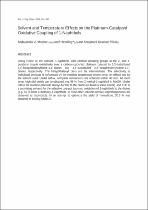 ResearchSpace
ResearchSpace
Solvent and temperature effects on the platinum-catalyzed oxidative coupling of 1-naphthols
JavaScript is disabled for your browser. Some features of this site may not work without it.
- ResearchSpace
- →
- Research Publications/Outputs
- →
- Journal Articles
- →
- View Item
| dc.contributor.author |
Maphoru, MV

|
|
| dc.contributor.author |
Heveling, J

|
|
| dc.contributor.author |
Kesavan Pillai, Sreejarani

|
|
| dc.date.accessioned | 2016-06-27T08:41:36Z | |
| dc.date.available | 2016-06-27T08:41:36Z | |
| dc.date.issued | 2015-08 | |
| dc.identifier.citation | Maphoru, M.V., Heveling, J. and Kesavan Pillai, S. 2015. Solvent and temperature effects on the platinum-catalyzed oxidative coupling of 1-naphthols. European Journal of Organic Chemistry, 2016, 331-337 | en_US |
| dc.identifier.issn | 1434-193X | |
| dc.identifier.uri | http://onlinelibrary.wiley.com/doi/10.1002/ejoc.201501280/abstract | |
| dc.identifier.uri | http://hdl.handle.net/10204/8588 | |
| dc.description | Copyright: 2015 Wiley. Due to copyright restrictions, the attached PDF file only contains the abstract of the full text item. For access to the full text item, please consult the publisher's website. The definitive version of the work is published in European Journal of Organic Chemistry, 2016, 331-337 | en_US |
| dc.description.abstract | Using H(sub2)O(sub2) as the oxidant, 1-naphthols with electron-donating groups at the 2- and 4-positions couple oxidatively over a carbon-supported platinum catalyst to 3,3'-substituted 1,1'-binaphthalenylidene-4,4'-diones and 4,4'-substituted 2,2'-binaphthalenylidene-1,1'-diones, respectively. The binaphthalenyl diols are the intermediates. The selectivity to individual products is influenced by the reaction temperature (room temp. or reflux) and by the solvent used. Under reflux, complete conversions are obtained within 40 min. At room temp. high diol yields can be obtained, e.g. 96 % from 2-methyl- 1-naphthol in MeOH. Under reflux the reaction proceeds always further to the diones (at least to some extent), and THF is a promising solvent for the selective one-pot two-step oxidation of 1-naphthols to the diones (e.g. 81 % from 4-methoxy-1- naphthol). In most other solvents (reflux) naphthoquinones are observed as byproducts. In an attempt to optimize the yield of menadione, 30.5 % was obtained in boiling MeNO(sub2). | en_US |
| dc.language.iso | en | en_US |
| dc.publisher | Wiley | en_US |
| dc.relation.ispartofseries | Workflow;16403 | |
| dc.subject | Platinum-catalyzed oxidative coupling | en_US |
| dc.subject | Platinum catalyst | en_US |
| dc.subject | MeOH | en_US |
| dc.subject | Binaphthalenyl diols | en_US |
| dc.subject | Binaphthalenylidene | en_US |
| dc.title | Solvent and temperature effects on the platinum-catalyzed oxidative coupling of 1-naphthols | en_US |
| dc.type | Article | en_US |
| dc.identifier.apacitation | Maphoru, M., Heveling, J., & Kesavan Pillai, S. (2015). Solvent and temperature effects on the platinum-catalyzed oxidative coupling of 1-naphthols. http://hdl.handle.net/10204/8588 | en_ZA |
| dc.identifier.chicagocitation | Maphoru, MV, J Heveling, and Sreejarani Kesavan Pillai "Solvent and temperature effects on the platinum-catalyzed oxidative coupling of 1-naphthols." (2015) http://hdl.handle.net/10204/8588 | en_ZA |
| dc.identifier.vancouvercitation | Maphoru M, Heveling J, Kesavan Pillai S. Solvent and temperature effects on the platinum-catalyzed oxidative coupling of 1-naphthols. 2015; http://hdl.handle.net/10204/8588. | en_ZA |
| dc.identifier.ris | TY - Article AU - Maphoru, MV AU - Heveling, J AU - Kesavan Pillai, Sreejarani AB - Using H(sub2)O(sub2) as the oxidant, 1-naphthols with electron-donating groups at the 2- and 4-positions couple oxidatively over a carbon-supported platinum catalyst to 3,3'-substituted 1,1'-binaphthalenylidene-4,4'-diones and 4,4'-substituted 2,2'-binaphthalenylidene-1,1'-diones, respectively. The binaphthalenyl diols are the intermediates. The selectivity to individual products is influenced by the reaction temperature (room temp. or reflux) and by the solvent used. Under reflux, complete conversions are obtained within 40 min. At room temp. high diol yields can be obtained, e.g. 96 % from 2-methyl- 1-naphthol in MeOH. Under reflux the reaction proceeds always further to the diones (at least to some extent), and THF is a promising solvent for the selective one-pot two-step oxidation of 1-naphthols to the diones (e.g. 81 % from 4-methoxy-1- naphthol). In most other solvents (reflux) naphthoquinones are observed as byproducts. In an attempt to optimize the yield of menadione, 30.5 % was obtained in boiling MeNO(sub2). DA - 2015-08 DB - ResearchSpace DP - CSIR KW - Platinum-catalyzed oxidative coupling KW - Platinum catalyst KW - MeOH KW - Binaphthalenyl diols KW - Binaphthalenylidene LK - https://researchspace.csir.co.za PY - 2015 SM - 1434-193X T1 - Solvent and temperature effects on the platinum-catalyzed oxidative coupling of 1-naphthols TI - Solvent and temperature effects on the platinum-catalyzed oxidative coupling of 1-naphthols UR - http://hdl.handle.net/10204/8588 ER - | en_ZA |





